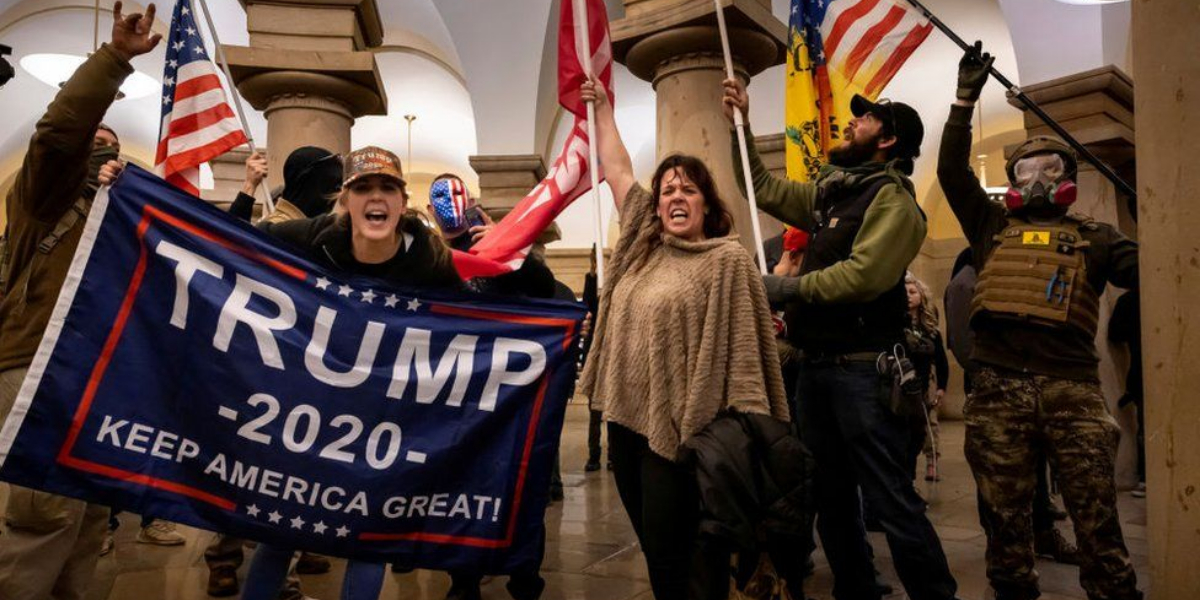- After 11 months of work, on January 6, 2021, the congressional commission investigating on the US Capitol riot and the events that followed held the first public hearing to make public the conclusions.
- On the other hand, the rest of the Republicans saw this process as a unilateral and illegal party process.
- Before the January 6 commission could prove that Trump had intentionally violated Joe Biden’s peaceful and just transfer of power, he had to prove that the then president had knowingly spread false information.
After 11 months of work, on January 6, 2021, the congressional commission investigating on the US Capitol riot and the events that followed held the first public hearing to make public the conclusions.
It was an unprecedented evening. Even Watergate, the standard for high-level, politically powerful parliamentary hearings, did it all during the day.
One Democrat and two Republicans on the committee stressed the importance of presenting their work to the general American public for legislative action to protect American democracy from historical and future attacks. On the other hand, the rest of the Republicans saw this process as a unilateral and illegal party process.
Read more: Donald Trump wants ‘King Donald’ book in all US schools
All three major broadcasters, as well as all major cable news channels except Fox News, will fully cover Thursday’s hearings, so the U.S. public will have ample opportunity to appeal. If President Benny Thompson had a question about whether he thought Donald Trump was personally responsible for the attack on the Capitol, he put it at the beginning of his opening remarks. At the time, the president said, “We were trying to prevent a peaceful transfer of power.” “At the heart of this assassination was Donald Trump,” he added.
These are powerful words. Now the committee has to present evidence to prove it.
If that is what Mr Thompson and others really believe, the question is whether the committee will recommend to the former chairman that he be charged with serious offenses. Minutes after Thursday night’s hearing, President Trump accused Trump of doing something. Before the January 6 commission could prove that Trump had intentionally violated Joe Biden’s peaceful and just transfer of power, he had to prove that the then president had knowingly spread false information.
To this end, Liz Cheney, Vice-Chair of the Committee, declined to refute any specific statement made by the Chair and his supporters. Instead, he played videos with his aides to the president to validate the election results.
Read more: Trump slams Liz Cheney during a rally supporting her primary opponent in Wyoming
In a key passage, the president’s attorney general, Bill Barr, told the president how he used sarcastic sarcasm to tell the president that his accusations of widespread electoral fraud were unfounded. They mostly swore at the former president with the team’s words.
The first hearings were considered different from the usual events of the Congress. Instead of giving the congressmen a microphone, it will be a well-established business that uses videos and evidence to tell powerful stories. It didn’t start that way. Mr. Thompson was short, but Mr. Cheney, a Republican who fought for his party, spoke monotonously for about half an hour. The charges against him were serious, but the words were interspersed with long paragraphs, numbered lists and “I show you” explanations.
Not only did the commission release lengthy videos of the attack, but it consisted primarily of police security and surveillance cameras and Trump’s voice clips and tweets. The drama of that day was instinctive, not milky. After the video ended, the audience was silent. Many lawmakers watched the guests sitting in surprising silence behind the camera, and the family of the policeman who died in the attack wept.
The group has so far conducted more than 1,000 interviews, but three of them (Donald Trump’s daughter, Ivanka Trump, Donald Trump’s son and son-in-law Jared Kushner) have been particularly interesting. On Thursday night, the audience saw for the first time a short but spoken word between the two.
At the time, Trump said Attorney General Bill Barr had no reason to doubt his father’s defeat in the election. Kushner did not accept threats from members of Trump’s legal team to resign in protest of Trump’s illegal and unfounded election process.
Trump’s eldest son, on the other hand, never existed. More videos may be revealed at future auditions, but if the audience hopes for a family quarrel, the hearing failed.
At the hearing, the commission allowed only two documentary filmmakers, Nick Quested and Capitol Police Officer Caroline Edwards, to testify. The first was Officer Edward, whose personal account supported the second half of the trial, but the first provided some information about the preparations of the arrogant men who were preparing to attack the Capitol.
He talked about how he saw the crowd gathered at the Capitol Police Station and the leaders of the proud bastards at the pre-attack concert. He said he hit a concrete staircase and lost consciousness. After recovering, he tried to protect the Capitol, but was later attacked with a chemical spray by Officer Brian Siknik, who died. “What I saw was like a war movie,” he said. “I couldn’t believe my eyes. Ground officers were bleeding and spilling … It was a massacre. It was chaos. ”

















